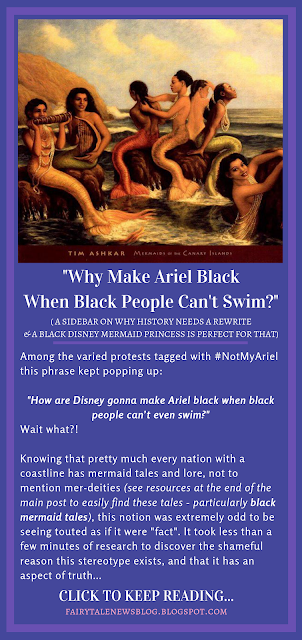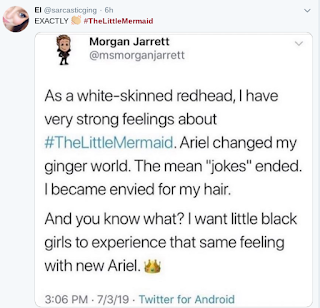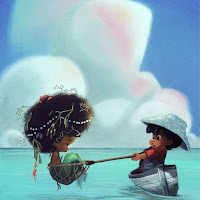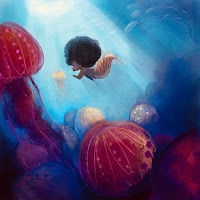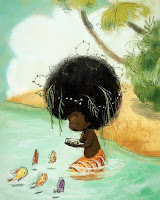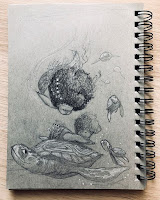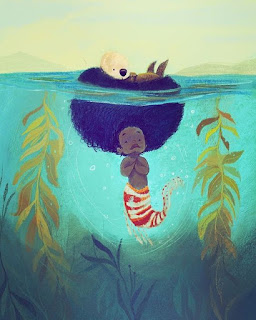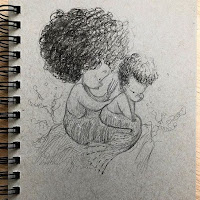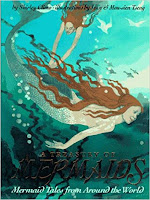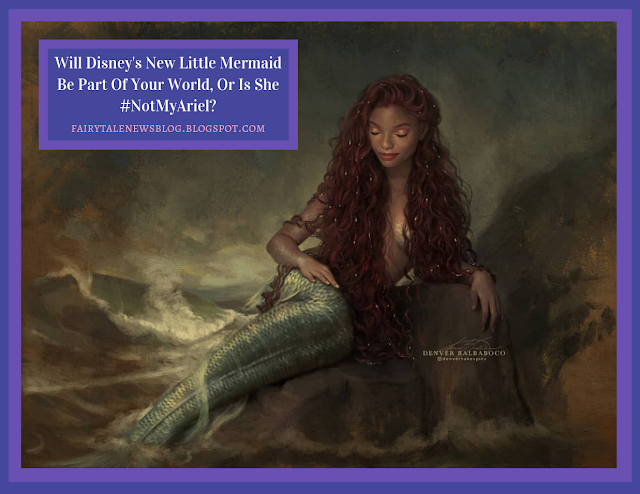
| Art by Denver Balbaboco (click name for portfolio link) IG: denvertakespics (see IG & image details at this link) |
“It was abundantly clear that Halle possesses that rare combination of spirit, heart, youth, innocence, and substance — plus a glorious singing voice — all intrinsic qualities necessary to play this iconic role,” said (Director Rob) Marshall.
Exactly what Disney’s live-action Little Mermaid needs to be – right?
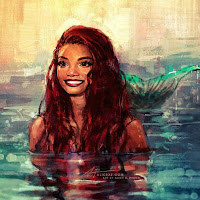 |
| Artist: Alice X. Zhang Halle Bailey as The Little Mermaid (complete with red hair) |
The announcement that black actress Halle Bailey (star of Grown·ish, half of the R&B duo Chloe x Halle) is set to star as Ariel in Disney’s live-action The Little Mermaid has certainly polarized social media. While multitudes celebrated Disney supporting diversity in their live-action casting of a classic and beloved film, the #NotMyAriel hashtag took off in almost the same moment. In the too-long list of complaints, they appear to center around the change in look and image of a figure people have loved – and identified with – since they were kids. But that’s kind of the point. People have seen themselves in Ariel for almost two generations, with the emphasis on “selves”. When the disgruntled began to cite culture*, history, and even science (!) it became clear that these objections were actually outing a privileged and endemically racist viewpoint. For those watching, it should be noted that the #NotMyAriel reaction is not coming from kids. Kids across the board are responding with excitement. The disgruntled demographic is embarrassingly specific: 30yrs+ white women.
The “original Ariel”, Jodi Benson, raised her voice on the matter too:
“I think that the spirit of a character is what really matters,” (Benson) replied. “What you bring to the table in a character as far as their heart, and their spirit, is what really counts.”
Benson talked about how channeling Ariel’s inner spirit is how she herself has been able to step into the role over the years, despite getting older:
“And the outside package — cause let’s face it, I’m really, really old — and so when I’m singing “Part of Your World,” if you were to judge me on the way that I look on the outside, it might change the way that you interpret the song. But if you close your eyes, you can still hear the spirit of Ariel. “We need to be storytellers,” she concluded. “And no matter what we look like on the outside, no matter our race, our nation, the color of our skin, our dialect, whether I’m tall or thin, whether I’m overweight or underweight, or my hair is whatever color, we really need to tell the story.” (Source: combookmovie.com)
Doing our best to get all sides of the story, our Fairy Tale News Hounds spent a long time reading through multiple responses to the news on various social media outlets and were very glad to find that there are many white voices being raised in support of sharing – and representing – the magic they felt as five-year-olds with children of every color, especially those with dark skin.
One response in particular melted our hearts.
This is it:
–Intermission–
 |
| Annie Leibovitz photography fro Disney Dream Portraits, featuring Julianne Moore as Ariel |
 |
|
Parody poster of Mera (artist unknown)
Amber Heard as The Little Mermaid, all grown up
|
- Disneyland & Disney World/s live Ariel character performers (for 30 years)
- The Little Mermaid musical – the title role in the big Disney version/s and the school-approved versions
- Every Disney Little Mermaid Halloween/roleplay/cosplay costume ever
- All the Ariel dolls
- Not to mention her image on hundreds of products
- The Annie Leibovitz poster photo of Julianne More as Ariel for Disney Dream Portraits (and Queen Latifah as Ursula)
- Once Upon A Time’s live-action Ariel – a repeat role in the series (played by JoAnna Garcia Swisher) – note that this version is on film and includes many iconic scenes from the classic movie as they fit the story being told
- Mera from DC’s Aquaman 2018
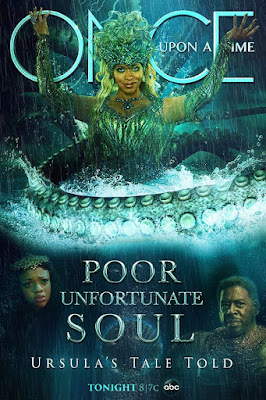 |
| ABC OUAT special episode promo poster |
 |
| Tiffany Boone as young Ursula with mer-tail (pre-tentacles) (OUAT ep 4:11) |
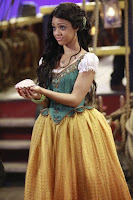 |
| Tiffany Boone as young Ursula on land (OUAT ep 4:11) |
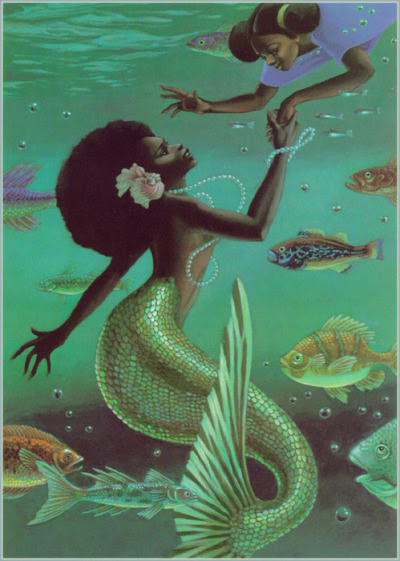 |
“Mary Belle and the Mermaid” illustration by Leo & Diane
Her Stories: African American Folktales, Fairy Tales, and True Tales by Virginia Hamilton(Coretta Scott King Author Award Winner) |
With Melissa McCarthy now confirmed for the role of Ursula, we’re already holding our breath for that moment when the white lady takes away the black girl’s voice… yikes!
But perhaps that’s what Disney and Director Rob Marshall are planning to acknowledge and explore. Although women as a whole have had it tough for the majority of written history, when it comes to inequality it must be acknowledged that white women are not completely blameless. It would seem it’s a hard conversation to have but that makes it worth having all the more. The negative reaction to the casting of Halle Bailey as Ariel by a rather large (and vocal) demographic has been surprising, and uncovered a hidden white-privilege mindset among long-time (mostly female) fans – women who believe themselves to be progressive, inclusive and ‘woke’.
That the negative response to Disney’s casting of Halle Bailey was – and is – so very emotional and feels personal to those objecting is a clue to just how endemic white privilege is and that’s a scary thing, especially seeing it come from intelligent people you know and love, and, let’s be honest, in some cases ourselves. To be clear, there is no doubt many of these women are much more progressive than their predecessors but that doesn’t mean there isn’t still (a lot of) work to do. That this is happening at all should make it clear that this issue needs to be addressed, and attitudes – and assumptions – reassessed. Now. While we will admit we were hoping a wonderful drag queen (with all the singing and acting chops) would be cast in the villain’s role to nod to the character’s original inspiration (Harris Glenn Milstead, better known as Devine), putting a powerful white woman in the antagonist role opposite a lovely young black heroine is going to resonate…
Uncomfortable? Yes.
Worth the trouble and ruffled feathers (er scales)? Absolutely.
We are so here for this movie!
BOOKS:
A Treasury of Mermaids: Mermaid Tales from Around the World – a diverse cultural collection of tales by folklorist Shirley Climo
Mermaid and Other Water Spirit Tales From Around the World (Surlalune Fairy Tale series) by Heidi Anne Heiner
Mermaid Tales From Around the World by Mary Pope Osborne
The Annotated African American Folktales edited by Henry Louis Gates, Maria Tatar, includes a mermaid tale with annotations
- Becoming Mermaids – American Museum of Natural History (Note the Australian Yawk Yawk – looked like a typical mermaid -half-human, half-fish, well before any European influence)
- 9 Mermaid Legends From Around the World (Mentalfloss)
- Mermaid Tales Appear in Myths Around the World – Arnhem Land Included (ABC.net.au)
- Mami Wata, the most celebrated mermaid-like deity from Africa who crossed over to the West (face2faceafrica.com)
- Goddess Yemaja (a personal blog)
- Mermaids Around the World That Are Far From Dream Girls (BuzzFeed)
- The Cultural Significance of Mermaids Around the World (Mermaids of Earth – website dedicated to mermaids around the globe – lore, art, tales, influence, enjoyment and ocean conservation)
** Other Disney “Trial-Runs” On OUAT:
- black Rapunzel (huge hit! though they also had a white version as well)
- female Jack (of the famous beanstalk)
- lesbian Mulan (& Dorothy – a nice nod to the LGBTQ community and their famed love of the MGM movie)
- a maternal Maleficent (which the Disney live-action movie also used)
- a Latina Cinderella

- this Twitter thread on Medieval mermaids(a fun examination of the logic behind the folks citing historical reasons to keep Ariel white)
- anamusing recap of ABC Once Upon A Time‘s episode “Poor Unfortunate Souls” (some familiarity with the main characters in the OUAT series will be helpful, but not essential to the Ursula backstory/plot as it’s essentially a stand-alone story)
- ‘The Little Mermaid’: A Milestone in Colorblind Casting, but Black Fairy Tales Need Representation Too – there are a LOT of black fairy tales that could use a little love from Hollywood
- article from the Washington Post explaining the social media tumult of the black casting of Halle as Ariel and explaining why a strong black mermaid is part of black people’s ancient traditions in Mami Wata – Africa celebrated black mermaids long before Disney and #NotMyAriel
Mermaids, of course, don’t belong to one region. The earliest fish-women emerged in southwestern Asia’s ancient Mesopotamia, said Sarah Peverley, a cultural historian at the University of Liverpool in England.
“But almost every culture has a version of a mermaid,” she said. “They come in all shapes, sizes and skin color.”
When the Danish author Hans Christian Andersen published “The Little Mermaid” in 1837, people across Africa were already swapping tales about Mami Wata. (Washington Post)
